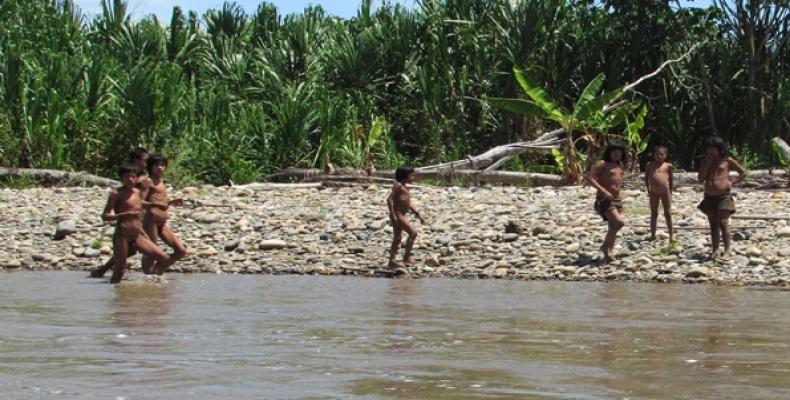Lima, July 18 (teleSUR-RHC)-- Peru’s Ministry of Culture held a press conference on Thursday announcing their implementation of a “plan of controlled contact” with the indigenous group Mashco Piro in the region of Madre de Dios.
However, the government is making contact with the community against the recommendations of the Inter-American Commission of Human Rights.
It is estimated that Peru has over 5,000 indigenous people in communities that are either completely or partially isolated in the regions of the Peruvian rainforest.
Rare pictures of Mascho Piros first appeared in major media outlets in February 2012. They inhabit an area in the southeastern part of the country, which is part of the Amazon Rainforest. The designation “uncontacted people” refers to those who have not had significant interactions with other communities.
Vice Minister of Inter-culturality Patricia Balbuena explained a team of interpreters and translators from the Ministry of Culture “performed fieldwork with the communities of Mascho Piros with the goal of getting to know their concerns.” She said the decision to initiate contact was made because of repeated sightings and encounters between the isolated community and other residents in the region.
Personnel from the Ministry of Culture have moved to the area to prevent tourists and religious groups from providing the Mashco Piro with food, clothes, and any other equipment. Balbuena also claimed one of the aims of the plan is to obtain information about why this group is coming out of isolation.
According to Balbuena, there have been 70 sightings of members of Mashco Piro in 2014 and five incidents in which members of this community visited areas with other residents in the region. The vice minister stated that if the government does not take the necessary steps to contact the Mashco Piro, the latter will be at risk of catching diseases from other people.
As of Friday, the government has implemented an emergency plan to vaccinate the communities of Diamante and Shepetiare with whom the Mashco Piro have reportedly had contact.
However, in a document titled “Indigenous peoples in voluntary isolation and first contact in the Americas,” the Inter-American Commission on Human Rights states that governments should adopt measures to guarantee the principle of no contact with peoples in isolation by any group. The report further urges the prohibition and penalties for forcing contact, including by religious organizations. The document stipulates that states should ensure no illicit activities take place in areas where isolated communities live, including drug trafficking and the extraction of natural resources.


